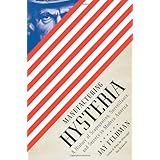
Average Reviews:

(More customer reviews)Are you looking to buy Manufacturing Hysteria: A History of Scapegoating, Surveillance, and Secrecy in Modern America? Here is the right place to find the great deals. we can offer discounts of up to 90% on Manufacturing Hysteria: A History of Scapegoating, Surveillance, and Secrecy in Modern America. Check out the link below:
>> Click Here to See Compare Prices and Get the Best Offers
Manufacturing Hysteria: A History of Scapegoating, Surveillance, and Secrecy in Modern America ReviewJay Feldman's book is another important addition to the literature of surveillance, scapegoating and secrecy embedded so deeply in the history of the United States.This tradition of American paranoia is long. Its roots started to grow in the Salem witch trials towards the end of the 17th century, and then the nativist tendencies along the Know-Nothing groups of the 19th century spread their wings deep into the beginning of the twentieth century. This is the starting point of Felman's book. He discusses in detail the anti-German hysteria during WW1, when the theater of the absurd reached its apogee, for example, after Sauercraut became "liberty cabbage, while a hamburger got the name of "liberty steak". German language courses were removed from school curricula and even whole towns were renamed to remove any hint of German influence.
The Palmer raids, the deporation of Mexicans during the thirties and the concentration camps which were populated by Japanese-American citizens during the Roosevelt years followed. To be more precise, there were 112000 ethnic Japanese who were incarcerated in concentration camps along the West coast three months after the Pearl Harbour attack. This was Executive Order 9066, issued by Roosevelt. But according to Jay Feldman, this was not because of the attack. Racism was the sole cause of the Japanese and Japanese-American relocation and this process began at least five years before "the infamous day" and was originally aimed at Communists, Fascists, and Nazis.
In a report published in 1982, the Commission on Wartime Relocation and Interment of Civilians stated that this order "was not justified by military necessity...but because of race prejudice, war hysteria and a failure of political leadership".
In the fifties Joe MacCarthy made his appearance on the paranoic stage, while the sixties had the COINTELPRO and CHAOS programs-all programed and aimed at the liberty of American citizens. The methods used by the FBI (under the sick and perverted mind of Edgar J. Hoover), the CIA , the NSA and other government agencies remind one of the same methods used by totalitarian regimes elsewhere in the world during those times. The FBI, for example, did not hesitate to violate the law in order to achieve its goals. KKK informers and infiltrators often took part in violent acts, and the bureau, while not condoning such behaviour, did not expressly forbid participation. "You can do anything to get your information", the FBI told the informer Gary Thomas Rowe, who was ultimately indicted for the March 1965 slaying of the civil rights demonstrator Viola Liuzzo. "We don't want you to get involved in unnecessary violence, but the point is to get the information". In spite of the 500000 "subversives' whose cases were analyzed between 1960 and 1974, not one individual was prosecuted for planning, advocating, or attempting to overthrow the U.S government-which was the alleged reason for half-million investigations. As the syndicated Washington columnist Joseph Kraft, who had been the subject of an intense eavesdropping effort beginning in 1969, said: "We came a hell of a lot closer to a police state than I thougt possible".
The Church Committee, which was established in 1975, and whose purpose was to investigate the illegal actions of the agencies mentioned above, came to the conclusion that "government officials -including those whose principal duty is to enforce the law-have violated or ignored the law over long periods of time and have advocated and defended their right to break the law". Those strictures which were imposed on the FBI and additional agnencies, curbing their illegal actions, were again disregarded after the 9/11 attacks, because they "have hampered our ability to fight terrorism. The FBI was now authorized to monitor libraries, political groups, religious organizations and the Internet, as well as the international phone calls and e-mails of thousands of individuals within the United States-all these under the Bush administration and with the help of advanced technology.
This book shows to what extent democracy is abused by the authorities which were assigned to protect it, showing how fragile democracy can be.
It should be wise to quote Idaho Senator William Borah's words, written in the twenties: "The safeguards of our liberty are not so much in danger from those who openly oppose them as from those who, professing to believe in them, are willing to ignore them when found inconvenient for their purpose, the former we can deal with, but the latter, professing loyalty, either by precept or example undermine the very frist pronciples of our Government, and are far the more dangerous".Manufacturing Hysteria: A History of Scapegoating, Surveillance, and Secrecy in Modern America Overview
Want to learn more information about Manufacturing Hysteria: A History of Scapegoating, Surveillance, and Secrecy in Modern America?
>> Click Here to See All Customer Reviews & Ratings Now
0 comments:
Post a Comment